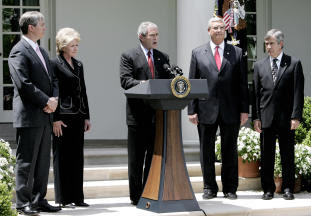by DAVID IVANOVICH
But the White House doesn't plan to issue a final rule until the very last days of Bush's term in office.
Responding to last month's Supreme Court ruling that the Environmental Protection Agency must take action under the Clean Air Act to regulate greenhouse gas emissions from cars and trucks, Bush has directed his administration to draw up a regulation — patterned on his State of the Union address proposal — to reduce gasoline consumption by 20 percent over 10 years.
 But White House might not issue final plan until his term nearly done
But White House might not issue final plan until his term nearly done
That plan called for dramatically expanding the use of renewable energy sources and increasing fuel mileage requirements for cars and light trucks.
"When it comes to energy and the environment, the American people expect common sense, and they expect action," Bush said in a ceremony in the White House's Rose Garden. Bush's announcement came as AAA reported Monday that the national, average price for regular unleaded gasoline had hit a record of $3.07 a gallon.
The previous record of $3.05 per gallon was set in September 2005 after Hurricane Katrina hobbled the nation's fuel-making capabilities.
In Houston, gasoline was $2.89 on average for a gallon of regular unleaded. The highest average ever in Houston was $2.97, according to AAA.
That, too, came in Katrina's wake.
The current run-up in gasoline prices has been caused by rising crude prices, higher consumer demand this year, reduced gasoline imports and downtime at refineries.
The president's announcement also followed word that German-based DaimlerChrysler would sell a controlling interest in the troubled American car manufacturer Chrysler to equity firm Cerberus Capital Management.
Bush's State of the Union address proposal called for increasing fuel-efficiency standards by 4 percent a year, starting in model year 2010 for cars and 2012 for light trucks. Administration officials calculate such a change would reduce gasoline consumption by 8.5 billion gallons in 2017, representing a 5 percent reduction in the gasoline usage expected by that year.
Bush's State of the Union proposal also called for mandating that the American driving public use 35 billion gallons of renewable and alternative fuels by 2017.
One-fifth reduction
But Bush warned crafting a rule will take many months, as administration officials evaluate issues such as safety and cost.
"This is a complicated legal and technical matter," Bush said.
"And it's going to take time to fully resolve. Yet, it is important to move forward, so I have directed members of my administration to complete ... the process by the end of 2008."
EPA Administrator Stephen Johnson said administration officials expect to have a proposed rule ready to unveil sometime this fall.
Democrats on Capitol Hill jumped on what they viewed as a stall tactic by the administration.
"In effect, the president asked his agency heads to share ideas and come up with a plan that is due three weeks before he leaves office," said Rep. Edward Markey, D-Mass., chairman of the House Select Committee on Energy Independence and Global Warming.
"Our oil dependence is too high, and the threat of global warming is too great, to allow half measures and delay to take the place of action any longer," Markey said.
Proposals to force auto- makers to roll out more fuel-efficient vehicles are gaining traction on Capitol Hill, among both Republicans and Democrats.
Last week, a Senate committee voted to increase fuel mileage requirements by 4 percent a year from 2020 to 2030.
News of the Chrysler sale "reminds us of the significant financial troubles facing America's auto industry," Sen. Pete Domenici of New Mexico, the ranking Republican on the Senate Energy and Natural Resources Committee, said Monday. "One of the reasons for these struggles is the failure of the Big Three to adapt to the growing need for vehicles that are more fuel efficient. The American consumer is now demanding vehicles that use less gasoline and emit less carbon dioxide."
Bush has also called on lawmakers to pass legislation based on his plan to reduce consumption by 20 percent.
Legislation preferred
When crafting the new rule, Johnson said, administration officials plan to follow options Justice Antonin Scalia laid out in a dissenting court opinion.
Under Scalia's formula, the EPA would have to regulate greenhouse gases if the agency determines they endanger public health.
If the agency decides the public health is not in danger or that for some other reason regulation would not be necessary, then the agency would not have to produce a new rule.
"So the Supreme Court did not direct us to regulate," Johnson said. "It identified ... three options."
Blogalaxia Tags: co2






















0 comments:
Publicar un comentario